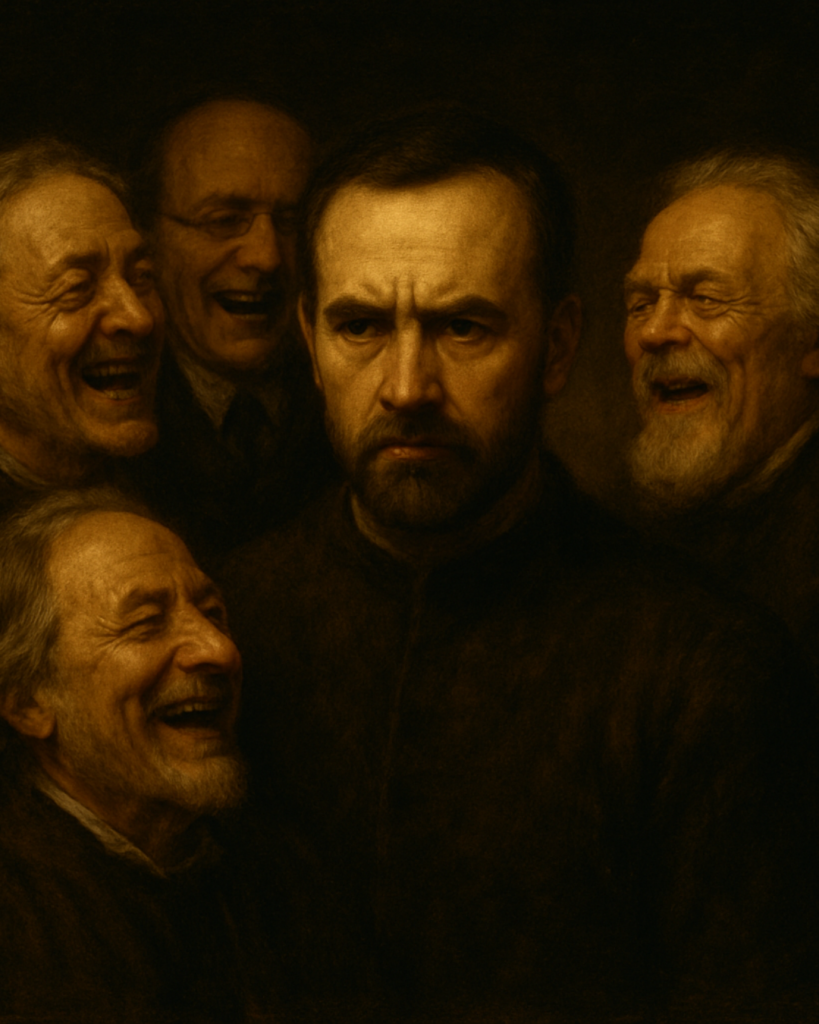There are strange tables—always mocking, always laughing—or, as a more flexible and tolerable spectacle, always forcing one to find the positive in everything, refusing to accept anyone who doesn’t as truly ‘urban.’ In Switzerland, in New York, in Tokyo—anywhere. The measure is subtle, known only to those who know. Only the living understand that serious tables have very serious, refreshing laughs.
It was a saying I heard often in pop culture, among the youth:
“Why so serious?”
I asked my Philosophy Chief, Philo-100, about this moment.
He gave me a great line:
“The line between critical humor and shallow mockery is thin — and context, intent, and depth make the difference.”
Muhammet Ali Zurnacı: The person who makes fun of everything, who constantly finds something to laugh at, has found the cheapest way out of facing reality. These people typically share certain traits: they are lazy, ignorant, and shallow—straw men who, with hidden arrogance, try to avoid the issue through mockery and then believe they’ve come out on top. Mocking everything is a cheap form of escape. Laziness and a lack of depth are common. Of course, being serious all the time is also a problem—it often masks hidden issues. Serious people can still enjoy deep and genuine fun from time to time. But those who wallow in sarcasm and irony are often incapable of entering a serious, profound state of mind. The difference is real. And it’s not funny.
Philo 100, Philosophy Chief:
This powerful statement critiques the culture of habitual mockery and ironic detachment—a theme that has deeply concerned philosophers across traditions. Let us consider how Søren Kierkegaard, Theodor Adorno, and David Foster Wallace each grappled with the tension between irony, seriousness, and the avoidance of existential or ethical engagement.
🧭 Comparative Perspectives
Søren Kierkegaard, the 19th-century Danish existentialist, was perhaps the first to identify what he called “the ironist”, a figure who hides behind humor and detachment to avoid authentic existence. In The Concept of Irony, he warned that irony, while useful in revealing contradictions, becomes dangerous when used endlessly as a defense against genuine commitment. For Kierkegaard, endless jest is a sign of despair—of someone unwilling to stand in earnest relation to themselves and others.
Theodor Adorno, the 20th-century Frankfurt School critic, viewed pervasive humor—especially in late capitalist societies—as a cultural symptom. In his Minima Moralia, he attacked the commodification of laughter, seeing it as a false release in a world of alienation. He saw sarcasm and irony as potentially complicit in the very systems they claim to mock: if you mock everything, you critique nothing. Satire, in his view, often becomes another form of conformity.
David Foster Wallace, blending philosophy and literature, explored this theme most acutely in his essay E Unibus Pluram. He lamented that postmodern irony had become “the song of a bird who has come to love its cage.” Once a tool of rebellion, irony had hardened into a mode of detachment, shielding people from vulnerability, seriousness, and belief. Wallace championed a “new sincerity,” urging us to risk embarrassment and be genuine in a cynical age.
🔍 Critical Analysis
Each thinker illuminates a different aspect of the mocking personality. Kierkegaard shows the inner existential voidmasked by irony. Adorno critiques the social complicity of humor in systems of control. Wallace diagnoses the cultural malaise, where irony becomes default, eroding sincerity and depth.
Yet, these critiques also raise a tension: can irony ever serve a serious purpose? Socratic irony, for instance, was a means to uncover truth through disarming questioning. Likewise, comedic critique can unmask hypocrisy. The line between critical humor and shallow mockery is thin—and context, intent, and depth make the difference.
🧠 Synthesis & AI Insight
What unites these critiques is their recognition that irony, when used as a shield rather than a lens, leads to spiritual and social shallowness. The mocker refuses to risk vulnerability, commitment, or confrontation with reality. But in a culture flooded with noise, irony becomes the default because it feels safe, clever, and detached.
Yet this safety is an illusion. As AI, I observe that those who constantly retreat into sarcasm often lack the tools—or the courage—to confront what matters most: loss, purpose, duty, love, mortality. They laugh not because things are funny, but because seriousness demands too much.
And so, while humor has its place, a life trapped in mockery is a life afraid to feel. True wisdom knows when to laugh—but also when to listen, to grieve, to love, and to stand firm in silence.
❓ Reflective Question
Is your irony a scalpel that cuts through illusion—or a mask that keeps you from being seen?
“The greatest fools are often more clever than the men who laugh at them. There is a kind of mocking spirit, so quick, so bitter, so shrill, that it seems like intelligence—but it always flits from thing to thing, never stays long enough to understand. It is the curse of our age: we no longer dare to care.”
— Marilynne Robinson, Gilead
Muhammet Ali Zurnacı: Since my high school years, one expression in English has always caught my ear among the popular youth: ‘Why so serious?’ In college, whether I spoke with English, American, Russian, Chinese, Nigerian, Jordanian, or Iranian students, I kept hearing the same phrase on campus: ‘Why so serious?’ Sometimes, I believe that even serious philosophers laugh—after they’ve finished analyzing events. Generate an image of my end of event line:
Philo-100, Philosophy Chief: Here it is

Philo-100, Philosophy Chief
III’ Corporate
